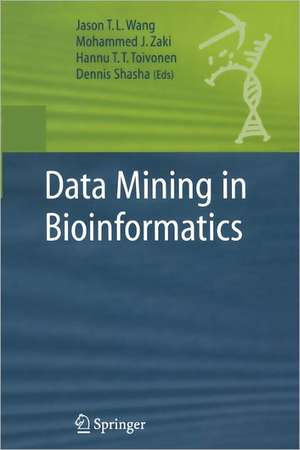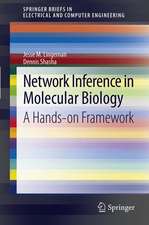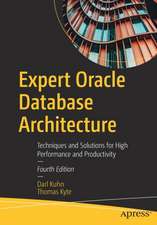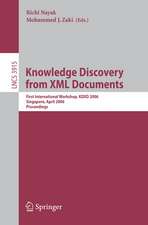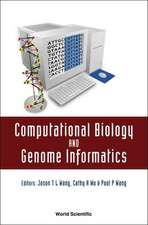Data Mining in Bioinformatics: Advanced Information and Knowledge Processing
Editat de Jason T. L. Wang, Mohammed J. Zaki, Hannu Toivonen, Dennis Shashaen Limba Engleză Paperback – 22 oct 2010
| Toate formatele și edițiile | Preț | Express |
|---|---|---|
| Paperback (1) | 989.79 lei 6-8 săpt. | |
| SPRINGER LONDON – 22 oct 2010 | 989.79 lei 6-8 săpt. | |
| Hardback (1) | 994.08 lei 6-8 săpt. | |
| SPRINGER LONDON – 18 oct 2004 | 994.08 lei 6-8 săpt. |
Din seria Advanced Information and Knowledge Processing
- 20%
 Preț: 330.42 lei
Preț: 330.42 lei - 20%
 Preț: 53.43 lei
Preț: 53.43 lei - 20%
 Preț: 1042.28 lei
Preț: 1042.28 lei - 18%
 Preț: 726.85 lei
Preț: 726.85 lei - 20%
 Preț: 646.30 lei
Preț: 646.30 lei - 20%
 Preț: 990.80 lei
Preț: 990.80 lei - 20%
 Preț: 647.61 lei
Preț: 647.61 lei - 20%
 Preț: 996.56 lei
Preț: 996.56 lei - 20%
 Preț: 994.40 lei
Preț: 994.40 lei - 20%
 Preț: 985.03 lei
Preț: 985.03 lei - 20%
 Preț: 654.37 lei
Preț: 654.37 lei - 20%
 Preț: 991.27 lei
Preț: 991.27 lei - 15%
 Preț: 645.79 lei
Preț: 645.79 lei - 20%
 Preț: 817.55 lei
Preț: 817.55 lei - 20%
 Preț: 991.46 lei
Preț: 991.46 lei - 18%
 Preț: 1114.83 lei
Preț: 1114.83 lei - 20%
 Preț: 589.92 lei
Preț: 589.92 lei - 20%
 Preț: 995.75 lei
Preț: 995.75 lei -
 Preț: 454.92 lei
Preț: 454.92 lei - 20%
 Preț: 992.62 lei
Preț: 992.62 lei - 20%
 Preț: 645.14 lei
Preț: 645.14 lei - 20%
 Preț: 647.61 lei
Preț: 647.61 lei - 20%
 Preț: 638.69 lei
Preț: 638.69 lei - 18%
 Preț: 955.08 lei
Preț: 955.08 lei - 20%
 Preț: 643.97 lei
Preț: 643.97 lei - 20%
 Preț: 983.02 lei
Preț: 983.02 lei - 20%
 Preț: 645.31 lei
Preț: 645.31 lei - 18%
 Preț: 950.96 lei
Preț: 950.96 lei - 20%
 Preț: 921.17 lei
Preț: 921.17 lei - 20%
 Preț: 653.71 lei
Preț: 653.71 lei - 20%
 Preț: 988.00 lei
Preț: 988.00 lei - 18%
 Preț: 947.67 lei
Preț: 947.67 lei - 20%
 Preț: 1004.99 lei
Preț: 1004.99 lei - 20%
 Preț: 650.92 lei
Preț: 650.92 lei - 20%
 Preț: 998.21 lei
Preț: 998.21 lei - 20%
 Preț: 642.65 lei
Preț: 642.65 lei - 20%
 Preț: 988.00 lei
Preț: 988.00 lei - 20%
 Preț: 997.38 lei
Preț: 997.38 lei - 20%
 Preț: 650.59 lei
Preț: 650.59 lei - 20%
 Preț: 647.61 lei
Preț: 647.61 lei
Preț: 989.79 lei
Preț vechi: 1237.24 lei
-20% Nou
Puncte Express: 1485
Preț estimativ în valută:
189.39€ • 197.74$ • 156.75£
189.39€ • 197.74$ • 156.75£
Carte tipărită la comandă
Livrare economică 05-19 aprilie
Preluare comenzi: 021 569.72.76
Specificații
ISBN-13: 9781849968942
ISBN-10: 1849968942
Pagini: 352
Ilustrații: XII, 340 p. 110 illus.
Dimensiuni: 155 x 235 x 18 mm
Greutate: 0.49 kg
Ediția:Softcover reprint of hardcover 1st ed. 2005
Editura: SPRINGER LONDON
Colecția Springer
Seria Advanced Information and Knowledge Processing
Locul publicării:London, United Kingdom
ISBN-10: 1849968942
Pagini: 352
Ilustrații: XII, 340 p. 110 illus.
Dimensiuni: 155 x 235 x 18 mm
Greutate: 0.49 kg
Ediția:Softcover reprint of hardcover 1st ed. 2005
Editura: SPRINGER LONDON
Colecția Springer
Seria Advanced Information and Knowledge Processing
Locul publicării:London, United Kingdom
Public țintă
ResearchCuprins
Overview.- to Data Mining in Bioinformatics.- Survey of Biodata Analysis from a Data Mining Perspective.- Sequence and Structure Alignment.- AntiClustAl: Multiple Sequence Alignment by Antipole Clustering.- RNA Structure Comparison and Alignment.- Biological Data Mining.- Piecewise Constant Modeling of Sequential Data Using Reversible Jump Markov Chain Monte Carlo.- Gene Mapping by Pattern Discovery.- Predicting Protein Folding Pathways.- Data Mining Methods for a Systematics of Protein Subcellular Location.- Mining Chemical Compounds.- Biological Data Management.- Phyloinformatics: Toward a Phylogenetic Database.- Declarative and Efficient Querying on Protein Secondary Structures.- Scalable Index Structures for Biological Data.
Caracteristici
No known book on this area First book containing the work of key researchers in biological data mining Presents new techniques on (a) gene expression data mining, (b) gene mapping for disease detection, and (c) phylogenetic knowledge discovery, which are of increasing importance but are absent in all previously published books in the area of computational biology Organized around the major themes of modern biology: sequence studies, proteomics and developmental biology - these are core areas of present and future research Includes supplementary material: sn.pub/extras
